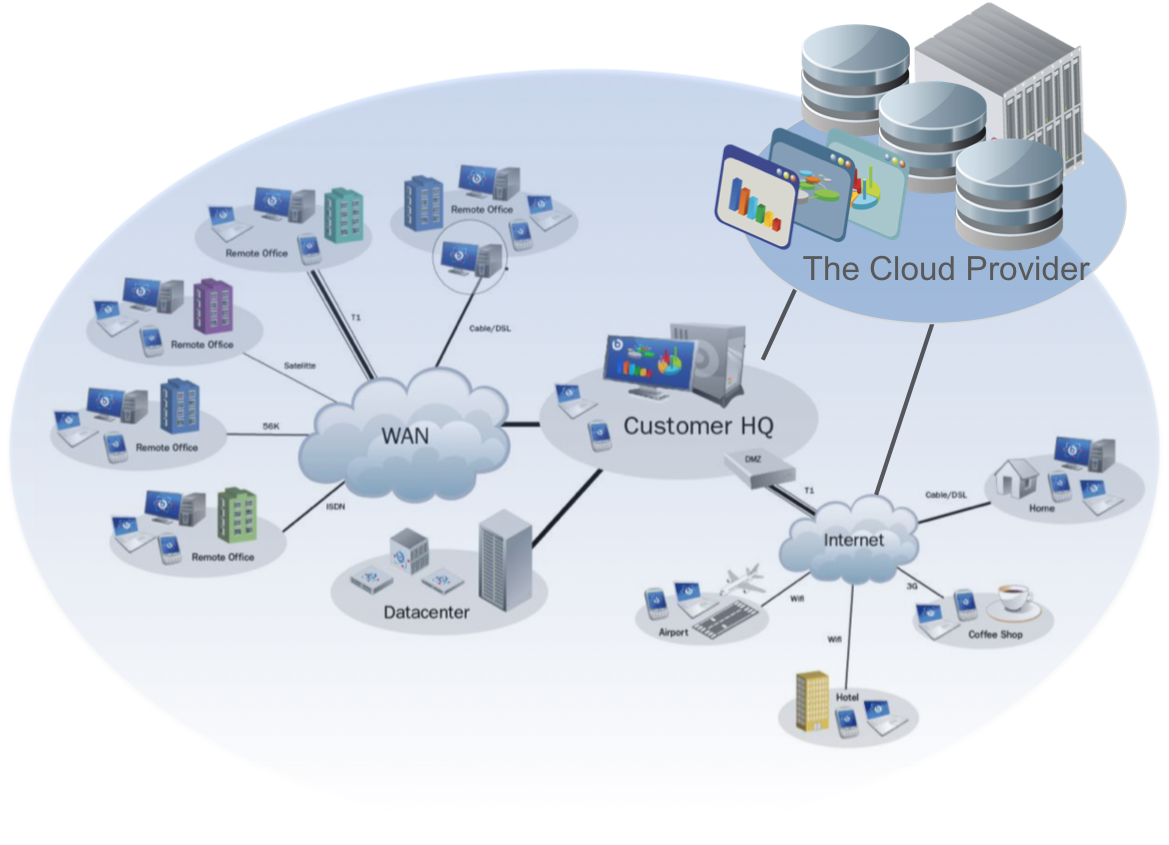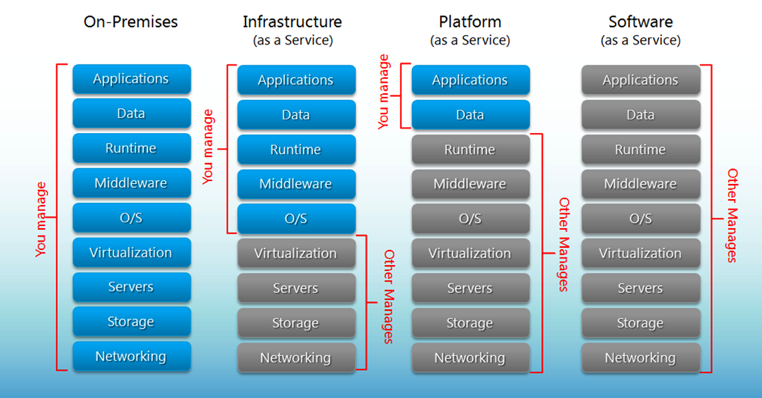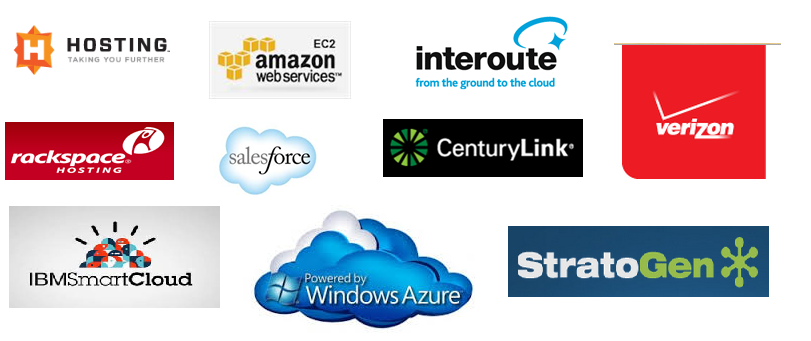Cloud Computing is the new innovative way of delivering software services via the Internet in a self service fashion. Applications residing on the Cloud can be accessed from anywhere, which supports an Internet connection. Software Solutions residing in cloud follow OnDemand Model as compared to the old OnPremise Model. OnDemand Model offers considerable cost saving, better performance, scalability, ease of maintenance and better reliability.

Vendors opting for cloud computing have noticed a significant impact in their business strategies, helped them focus on core features and pushing the product out in the market rather than spending hours to ensure up-time and troubleshooting environmental errors. This enables businesses to avoid significant capital expenditure on infrastructure and software development services.
Cloud Computing stack :

SaaS - Software as a Service This service delivers software as a service over the Internet, eliminating the need to install and run the application on the customer's computers and simplifying maintenance and support. It relates to "domain-specific" applications of payment service, content delivery, product search. As an example, ERP, CRM, Collaboration, Messaging, and Billing applications fall into this category.
PaaS - Platform as a Service This service delivers a computing platform and/or solution stack as a service, often consuming cloud infrastructure and sustaining cloud applications. It facilitates deployment of applications without the cost and complexity of buying and managing the underlying hardware and software layers. It concerns "non-domain-specific" applications of storage, messaging, and index. As an example, the Amazon Web Service called SimpleDB, SQS, and ElasticMR falls into this category.
IaaS - Infrastructure as a Service This service delivers computer infrastructure, typically a platform virtualization environment, as a service. Rather than purchasing servers, software, data center space or network equipment, clients instead buy those resources as a fully outsourced service. The service is typically billed on a utility computing basis and amount of resources consumed (and therefore the cost) will typically reflect the level of activity. It is an evolution of virtual private server offerings. As an example, the Amazon Web Service called EC2 falls into this category.
Benefits of Cloud Computing
Cloud computing provides some strong benefits. Selecting a perfect cloud implementation will depend on the application, performance, security and compliance requirements, but with the proper deployment cloud computing can provide significant savings, better IT services, and a higher level of reliability.
- Achieve economies of scale – increase volume output or productivity with fewer people. Your cost per unit, project or product plummets.
- Globalize your workforce on the cheap - People worldwide can access the cloud, provided they have an Internet connection.
- Streamline processes - Get more work done in less time with less people.
- Cost Efficient - There’s no need to spend big money on hardware, software or licensing fees. Traditional desktop software costs companies a lot in terms of finance. Adding up the licensing fees for multiple users can prove to be very expensive for the establishment concerned. The cloud, on the other hand, is available at much cheaper rates and hence, can significantly lower the company’s IT expenses. Besides, there are many one-time-payment, pay-as-you-go and other scalable options available, which makes it very reasonable for the company in question.
- Improve accessibility - You have access anytime, anywhere, making your life so much easier!
- Monitor projects more effectively - Stay within budget and ahead of completion cycle times.
- Minimize licensing new software - Stretch and grow without the need to buy expensive software licenses or programs.
- Improve flexibility - You can change direction without serious “people” or “financial” issues at stake.
- Almost Unlimited Storage - Storing information in the cloud gives you almost unlimited storage capacity. Hence, you no more need to worry about running out of storage space or increasing your current storage space availability.
- Less personnel training is needed - It takes fewer people to do more work on a cloud, with a minimal learning curve on hardware and software issues.
- Backup and Recovery - Since all your data is stored in the cloud, backing it up and restoring the same is relatively much easier than storing the same on a physical device.
- Automatic Software Integration - In the cloud, software integration is usually something that occurs automatically. This means that you do not need to take additional efforts to customize and integrate your applications as per your preferences.
- Quick Deployment - Cloud computing gives you the advantage of quick deployment. Once you opt for this method of functioning, your entire system can be fully functional in a matter of a few minutes.
- Resiliency and Redundancy - One of the benefits of a cloud deployment is that you can get automatic failover between hardware platforms and disaster recovery services to bring up your server set in a separate data center should your primary data center experience an outage.
ThoughtExecution Experience in Cloud Infrastructure
Selecting the best & robust cloud infrastructure to deploy the application is the most important step in the Cloud migration. There are few points which should be considered in order to choose the best cloud vendor. We have deeply worked on the scrutinization of the infrastructure requirements as there are many internal components which are integrated to make a complete cloud solution. Had also interacted with their sales managers/solution engineers to know how they will implement our application and tried to get the sense of their co-operation and the way they deal with the customers.
ThoughtExecution has experienced working with following cloud providers, have had a multiple meetings with these vendors over calls & online session, knowing the features they provide, their support & likewise.

We have hosted and deployed cloud solutions on almost all kind of hosting environments:
- Basic Colocation
- Managed Colocation
- Managed Dedicated Servers
- Public Cloud Computing
- Private Cloud Computing
ThoughtExecution Services offerings in Cloud Computing
We can help you to create a full strategy with all the minute operational details to manage your new landscape for higher business performance. With the new cloud technology you can build your own cloud environment, implement new cloud based application or software services and integrate your applications onto cloud based platforms.
- Cloud based web application development
- Multi Tenant Support
- Self Service Sign up
- Automated Subscription/Billing mechanism
- Scalability
- Monitoring, Configuring & Managing the application and tenants
- Unique User Identification and Authentication.
- Customization support for each tenant
- Migration of legacy application on Cloud environment
- Converting web application to Cloud application
- General Cloud based development
- Multi Tenant architecture development
- Amazon EC2 Development
- Cloud Architecture Consulting
- Maintenance and Support for Applications on Cloud
- Performance Management and Monitoring
- Security – Our cloud services and solutions provide all the benefits of a cloud-based infrastructure and application with top-of-the-line security. Our team is focused on providing secure, safe and most effective cloud services and solutions for your business and allows you to maintain full control over your data
- Reliability – Our cloud services and solutions are built on reliable and comprehensive cloud platform providing a reliable means for managing information, reducing risks and boosting security
- Recovery – We develop multiple layers of data protection with wide range for recovery options critically mapped with your applications
